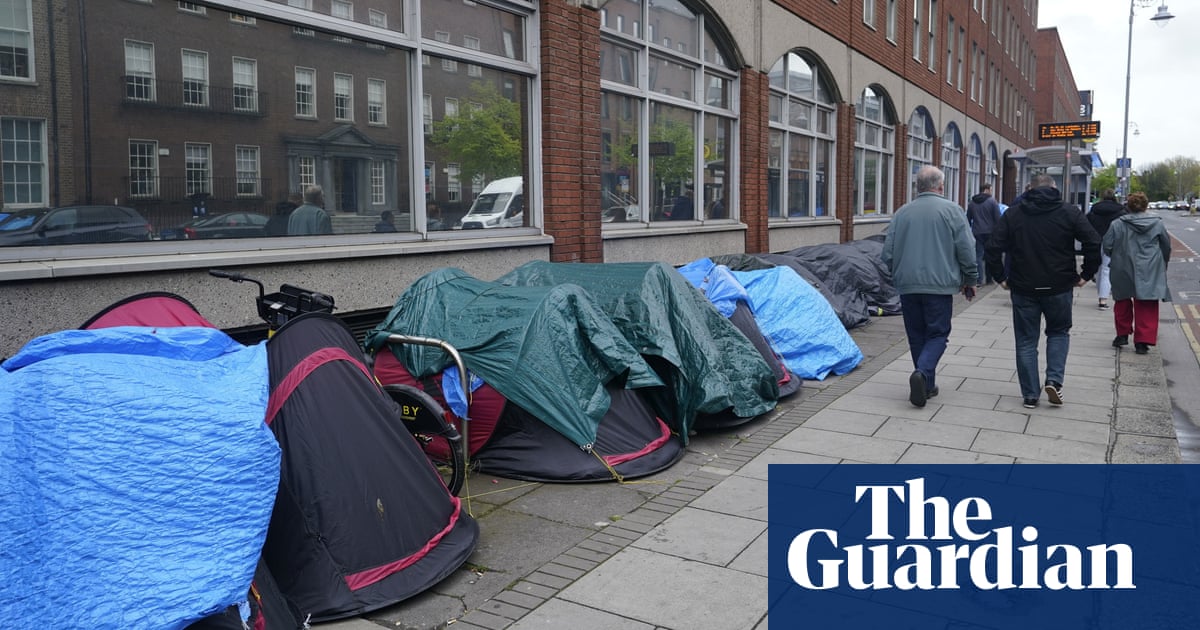
Rishi Sunak has said the UK will not accept the return of asylum seekers from Ireland and dismissed the prospect of a deal with Dublin.
The prime minister doubled down on his Rwanda deportation plan and appeared to reject any deal with the Irish government, which is alarmed at asylum seekers entering the republic from Northern Ireland.
The comments on Monday, three days before the Conservatives face voters in local elections, undercut an attempt to de-escalate what has emerged as the biggest threat to British-Irish relations since Brexit.
Asked if the UK could agree a returns scheme with Ireland, Sunak told ITV: “We’re not. I’m not interested in that. We’re not going to accept returns from the EU via Ireland when the EU doesn’t accept returns back to France where illegal migrants are coming from. Of course we’re not gonna do that. I’m determined to get our Rwanda scheme up and running because I want a deterrent.”
Asked if there were negotiations with the EU on returns, the prime minister said: “No. I’m focused squarely on getting our Rwanda scheme up and running.”
Downing Street hopes the Safety of Rwanda Act, a centrepiece of the Tory electoral campaign which received royal assent last week, will help stop people crossing on small boats from France.
A document quietly published by the Home Office on Monday night stated that Rwanda had agreed in principle to take 5,700 people, of whom 2,143 “continue to report … and can be located for detention”.
The Irish government says the threat of deportation to the east African country has partly fuelled a surge in arrivals entering Ireland via the land border with Northern Ireland, a route that it says now accounts for more than 80% of asylum seekers in the republic. The Irish Refugee Council and other advocacy groups questioned the figure.
On Tuesday the Irish cabinet will consider emergency legislation to facilitate returning asylum seekers to the UK – a legal fix required to reverse an Irish high court ruling last month that the UK was no longer a “safe third country” for returning asylum seekers because of the Rwanda plan.
Sunak’s dismissal of any deal with Dublin followed a joint press conference in which the Northern Ireland secretary, Chris Heaton-Harris, and Ireland’s foreign minister, Micheál Martin, spoke of cooperation.
The Rwanda plan was already working as a deterrent and that would increase once flights started, said Heaton-Harris. “We will obviously monitor all this very closely and continue to work with the Irish government on these matters,” he said, adding there was “no way that we would want to upset our relationship with Ireland”.
Martin said the meeting of the British-Irish intergovernmental conference, a forum set up under the Good Friday agreement, was “constructive” and “warm”. Any agreements on returns would have to be “mutual” and “reciprocal”, Martin added. A joint communique said both governments “noted the importance of continuing to work together” on irregular migration.
The two sides were eager to downplay a decision by the UK Foreign Office to postpone a meeting between the home secretary, James Cleverly, and his Irish counterpart, Helen McEntee, which prompted McEntee to skip other meetings with British officials.
Heaton-Harris said he was “comfortable” with the Irish government’s proposed legislation, which he said would reset the legal position to what it was before the court ruling.
However, the prime minister’s subsequent declaration that the UK would not accept returns from Ireland raised the prospect of an escalating crisis. The Irish government has yet to make public the terms of the proposed legislative fix, or what would happen if the UK did not cooperate.
The diplomacy unfolded against a backdrop of rising anxiety about deportations. Rivka Shaw, a policy officer at Greater Manchester Immigration Aid Unit, a legal advice centre, said thousands of people feared being “bundled into a van” and placed in detention.
“We’ve heard from people who are absolutely terrified,” she said. “That includes unaccompanied children who are in the asylum system [and] we’re talking about people who might have been here for two years already, living in our communities, going to our schools, possibly adults in education, volunteering, while waiting in this limbo of an asylum system.”
The imminent threat of detention would cause people to “disappear” from accommodation and skip appointments, exposing them to greater risk of exploitation in the “shadow economy”, said Shaw.
https://news.google.com/rss/articles/CBMiZ2h0dHBzOi8vd3d3LnRoZWd1YXJkaWFuLmNvbS91ay1uZXdzLzIwMjQvYXByLzI5L3VrLW5vdC1hY2NlcHQtcmV0dXJuLWFzeWx1bS1zZWVrZXJzLWlyZWxhbmQtcmlzaGktc3VuYWvSAWdodHRwczovL2FtcC50aGVndWFyZGlhbi5jb20vdWstbmV3cy8yMDI0L2Fwci8yOS91ay1ub3QtYWNjZXB0LXJldHVybi1hc3lsdW0tc2Vla2Vycy1pcmVsYW5kLXJpc2hpLXN1bmFr?oc=5
2024-04-29 22:03:00Z
CBMiZ2h0dHBzOi8vd3d3LnRoZWd1YXJkaWFuLmNvbS91ay1uZXdzLzIwMjQvYXByLzI5L3VrLW5vdC1hY2NlcHQtcmV0dXJuLWFzeWx1bS1zZWVrZXJzLWlyZWxhbmQtcmlzaGktc3VuYWvSAWdodHRwczovL2FtcC50aGVndWFyZGlhbi5jb20vdWstbmV3cy8yMDI0L2Fwci8yOS91ay1ub3QtYWNjZXB0LXJldHVybi1hc3lsdW0tc2Vla2Vycy1pcmVsYW5kLXJpc2hpLXN1bmFr
Tidak ada komentar:
Posting Komentar